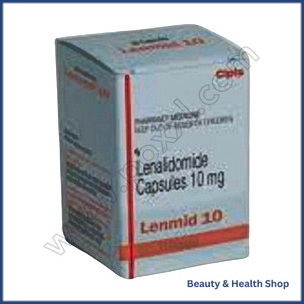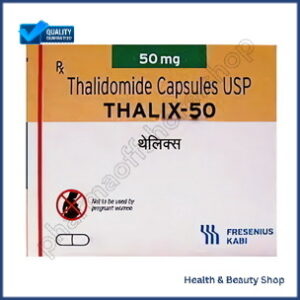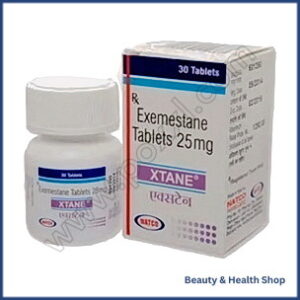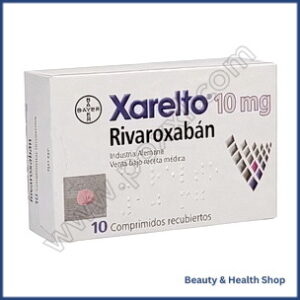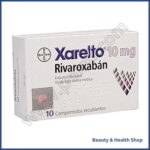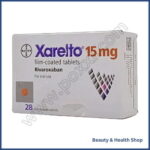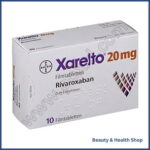ADDICTION
ALCOHOL DEPENDENCE
QUIT SMOKING
ALLERGY
ANTI FUNGAL
FUNGAL INFECTION
FUNGAL NAIL INFECTIONS
ANTI-REJECTION DRUGS
ANTI WORM
ANTIBIOTIC
BACTERIAL INFECTIONS
ARTHRITIS
GOUT
OSTEOARTHRITIS
RHEUMATOID ARTHRITIS
BLOOD
LOW PLATELET COUNT
THROMBOPHLEBITIS
VARICOSE VEINS
COLON
ANAL FISSURE
PILES
ULCERATIVE COLITIS
DIABETES CARE
DIABETES INSIPIDUS
DIABETES TYPE
DIABETIC FOOT ULCERS
GLUCOSE MONITOR
EYES/EAR CARE
DRY EYES
EYE CARE
EYE EXAMINATION
EYE INFECTION
EYE LASHES
EYE PAIN
GLAUCOMA
OCULAR HYPERTENSION
UVEITIS
FEVER CARE
MALARIA
RHEUMATIC FEVER
TYPHOID FEVER
GASTROINTESTINAL
ACIDITY
CONSTIPATION
CROHN'S DISEASE
DIARRHOEA
GALLBLADDER STONES
INTESTINAL ULCERS
IRRITABLE BOWEL SYNDROME
MOTION SICKNESS
NAUSEA
Lenmid (Lenalidomide)
Lenalid 5 mg (Lenalidomide)
| Amount | Price | Price / Unit |
Qty | ||
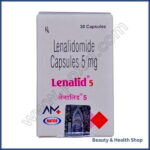
|
30 Capsules | $119.00 | $3.97 |
||

|
60 Capsules | $231.00 | $3.85 |
||

|
90 Capsules | $331.00 | $3.68 |
Lenmid 10 mg (Lenalidomide)
| Amount | Price | Price / Unit |
Qty | ||
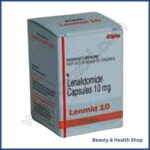
|
30 Capsules | $156.00 | $5.20 |
||

|
60 Capsules | $306.00 | $5.10 |
||

|
90 Capsules | $444.00 | $4.93 |
Lenmid 25 mg (Lenalidomide)
| Amount | Price | Price / Unit |
Qty | ||
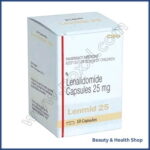
|
30 Capsules | $313.00 | $10.43 |
||

|
60 Capsules | $613.00 | $10.22 |
||

|
90 Capsules | $906.00 | $10.07 |
| Active Ingredient (Generic Name): | Lenalidomide |
|---|---|
| Indication: | Multiple myeloma, Lepra reaction |
| Manufacturer | Cipla Limited |
| Packaging: | 10 Capsules in one bottle |
From: $313.00
Lenalid, or lenalidomide, is a groundbreaking oncology medication. It enhances immune responses against cancer cells and blocks blood vessel growth to tumors. Prescribed mainly for multiple myeloma and myelodysplastic syndromes, it slows cancer cell growth and boosts blood cell production. Follow dosage instructions strictly, take capsules whole with water, and store at room temperature. Consult a healthcare provider for other medical uses, precautions, and potential drug interactions. Be mindful of common side effects like fatigue and serious ones like severe rashes. Guarantee prompt medical attention for emergencies and consider birth control while on lenalid. Additional monitoring through blood tests is essential. If you need more information, there’s valuable content ahead.
Start exploring the groundbreaking discovery of lenalidomide and its impact on medicine and patient care. Lenalidomide, a medication initially developed as a treatment for multiple myeloma, has revolutionized the field of oncology. Its discovery marked a significant advancement in the management of this type of cancer. By enhancing the body’s immune response against cancer cells and inhibiting the growth of blood vessels that feed tumors, lenalidomide has shown remarkable efficacy in extending the lives of patients with multiple myeloma.
Furthermore, researchers have also found lenalidomide to be beneficial in treating other conditions, such as myelodysplastic syndromes and mantle cell lymphoma. Its versatility in targeting different types of cancers has expanded its use beyond initial expectations. As a result, lenalidomide has become a cornerstone in the treatment of various hematologic malignancies, offering new hope to patients who previously had limited therapeutic options. The impact of lenalidomide on medicine and patient care continues to evolve as further research uncovers its full potential in combating a range of cancers.
Why is this medication prescribed?
Why is lenalidomide prescribed to patients? Lenalidomide is a medication commonly prescribed to treat various conditions, primarily in patients with certain types of cancer. Specifically, lenalidomide is used in the treatment of multiple myeloma, a type of cancer that affects plasma cells in the bone marrow. It is also prescribed for patients with myelodysplastic syndromes (MDS), a group of disorders where the bone marrow does not produce enough healthy blood cells.
In multiple myeloma, lenalidomide helps to slow down the growth of cancer cells and promote the destruction of these abnormal cells. For patients with MDS, lenalidomide can help improve blood cell production and reduce the need for blood transfusions. Additionally, lenalidomide may be prescribed for other conditions such as mantle cell lymphoma and certain skin conditions.
It is important to note that lenalidomide should only be used under the guidance and supervision of a healthcare provider experienced in the use of this medication, as it can have potentially serious side effects if not taken correctly.
How should this medicine be used?
To properly use lenalidomide, follow the dosage instructions provided by your healthcare provider, as this medication should be taken exactly as directed to guarantee its effectiveness and minimize potential side effects. Lenalidomide is usually taken orally once a day, with or without food. Swallow the capsules whole with water and do not break, chew, or open them. It is essential to adhere to the prescribed dosage and schedule to secure the best results from this medication. If you miss a dose, take it as soon as you remember, unless it is almost time for the next dose. In that case, skip the missed dose and continue with your regular dosing schedule. Do not take a double dose to make up for a missed one. Always store lenalidomide at room temperature, away from moisture and heat. Inform your healthcare provider about any other medications or supplements you are taking to prevent potential interactions with lenalidomide.
Other uses for this medicine
Exploring additional applications, lenalidomide may also be prescribed for conditions beyond its primary approved use. Apart from its established role in treating multiple myeloma and myelodysplastic syndromes, lenalidomide has shown efficacy in various other medical conditions. One such condition is mantle cell lymphoma, where lenalidomide is sometimes used in combination with other medications to manage the disease. Additionally, researchers are studying lenalidomide’s potential benefits in treating certain types of lymphomas and leukemias.
Moreover, lenalidomide is being investigated for its immunomodulatory properties in autoimmune disorders like lupus erythematosus and certain inflammatory conditions. Preliminary studies suggest that lenalidomide may help regulate the immune response and reduce inflammation in these diseases, although further research is needed to confirm its effectiveness.
While these uses are promising, it’s essential to consult a healthcare provider for guidance on lenalidomide’s suitability for specific conditions due to its potential side effects and interactions with other medications.
What special precautions should I follow?
Before beginning lenalidomide, it is important to check for potential drug interactions with your current medications. This precaution helps to prevent any adverse effects or reduced effectiveness of either drug. Be sure to consult with your healthcare provider or pharmacist to guarantee the safe use of lenalidomide alongside your other medications.
Check for Drug Interactions
When taking lenalidomide, always remember to check for potential drug interactions to guarantee your safety and effectiveness of treatment.
- Some medications may interact with lenalidomide, altering its effects or increasing the risk of side effects.
- Inform your healthcare provider about all the medications you are currently taking, including prescription, over-the-counter, vitamins, and herbal supplements.
- Your doctor can help assess potential interactions and adjust your treatment plan if needed to ensure the best outcomes.
What special dietary instructions should I follow?
To optimize the effects of lenalidomide, it is important to adhere to specific dietary guidelines provided by your healthcare provider. Maintaining a balanced and nutritious diet can help support your body’s ability to respond well to the medication. Your healthcare provider may recommend avoiding grapefruit or grapefruit juice while taking lenalidomide, as it can interfere with how the medication works in your body. Additionally, it is essential to stay hydrated by drinking an adequate amount of water daily, unless advised otherwise by your healthcare provider. Some individuals may experience gastrointestinal side effects such as nausea or diarrhea while taking lenalidomide. In such cases, consuming smaller, more frequent meals throughout the day and avoiding spicy or greasy foods may help alleviate these symptoms. If you have any specific dietary concerns or restrictions, be sure to discuss them with your healthcare provider for personalized recommendations tailored to your individual needs. By following these dietary instructions, you can support the effectiveness of lenalidomide and promote your overall well-being during treatment.
What should I do if I forget a dose?
If a dose of lenalidomide is missed, promptly take it as soon as you remember, unless it is almost time for your next scheduled dose. If you realize you forgot a dose near the time of your next scheduled dose, it is best to skip the missed dose and continue with your regular dosing schedule. Do not double the dose to make up for the missed one. Keeping a consistent dosing schedule is vital for the effectiveness of lenalidomide treatment. If you are unsure about what to do or if you have missed multiple doses, contact your healthcare provider for guidance. It’s important to follow the dosing instructions provided by your doctor to make sure that you are receiving the full benefit of this medication. Consistency in taking lenalidomide as prescribed can help optimize its therapeutic effects and minimize the risk of complications or reduced treatment efficacy.
What side effects can this medication cause?
Lenalidomide may cause various side effects, some of which can be serious. It is important to report any persistent side effects to your doctor. If you experience symptoms such as severe rash, chest pain, or shortness of breath, contact your healthcare provider immediately.
Report Persistent Side Effects
You may experience persistent side effects from taking lenalidomide, such as fatigue, nausea, or dizziness.
- Persistent fatigue: Feeling excessively tired or lacking energy even after resting.
- Nausea: Experiencing a sensation of discomfort in the stomach that may lead to vomiting.
- Dizziness: Feeling lightheaded, unsteady, or faint, which can affect your balance and coordination.
It’s important to monitor these side effects and report them to your healthcare provider promptly. Keeping track of your symptoms can help in managing any potential issues effectively. If you encounter any of these persistent side effects, it’s vital to seek medical advice to guarantee appropriate care and support.
Some side effects can be serious. If you experience any of the following symptoms, call your doctor immediately:
Persistent side effects from lenalidomide can sometimes escalate to more serious symptoms that require immediate medical attention. If you experience any of the following symptoms, contact your doctor promptly:
- Severe rash or skin reactions
- Difficulty breathing or swallowing
- Unusual bleeding or bruising
These symptoms may indicate a severe reaction to the medication and should not be ignored. Seeking medical help promptly can help manage these side effects effectively and prevent any complications. It’s essential to communicate any concerning symptoms to your healthcare provider to guarantee your well-being and safety while taking lenalidomide.
What should I know about the storage and disposal of this medication?
When storing lenalidomide, make sure to keep it in a cool, dry place away from direct sunlight and moisture. Store the medication at room temperature between 68-77 degrees Fahrenheit (20-25 degrees Celsius). Avoid storing lenalidomide in the bathroom or kitchen where there might be high humidity levels. Keep it in the original packaging or container provided by the pharmacist to protect it from light. Ensure that the medication is out of reach of children and pets to prevent accidental ingestion.
Disposing of lenalidomide should be done carefully. Do not flush it down the toilet or pour it down the drain unless instructed to do so. Instead, consult with your pharmacist or healthcare provider on the proper disposal methods. They may have specific guidelines for safe disposal that you should follow. If you have any expired or unused lenalidomide, it is advisable to return it to a pharmacy or follow the disposal instructions provided with the medication. Proper storage and disposal of lenalidomide are essential to maintain its effectiveness and prevent harm to others.
In case of an emergency/overdose
In case of an emergency or overdose involving lenalidomide, immediate medical attention is necessary to address the situation effectively. If you suspect an overdose or experience severe side effects such as difficulty breathing, fainting, or severe dizziness, contact emergency services right away. It is vital to provide healthcare providers with information about the amount of lenalidomide taken and any symptoms experienced to guarantee appropriate treatment.
Do not attempt to treat an overdose of lenalidomide on your own or induce vomiting unless instructed by medical professionals. Emergency medical personnel are equipped to provide the necessary care and support in case of an overdose. Keep the medication packaging or information on hand to share with healthcare providers, aiding in prompt and accurate treatment.
What other information should I know?
For additional critical information, be sure to consult your healthcare provider about lenalidomide. It’s crucial to inform your healthcare provider about any medications, supplements, or herbal products you are currently taking before starting lenalidomide, as they may interact with this medication. Lenalidomide can weaken the immune system, making you more susceptible to infections. Be cautious and avoid close contact with people who have infections while taking this medication. It’s vital to use effective birth control while on lenalidomide, as it can cause harm to an unborn baby. If you become pregnant or think you may be pregnant while taking lenalidomide, inform your healthcare provider immediately. Regular blood tests are necessary to monitor your blood cell count and liver function while on lenalidomide. Contact your healthcare provider if you experience symptoms like unusual bruising or bleeding, persistent fatigue, yellowing of the skin or eyes, or signs of infection while taking this medication.
Brand names
Consider exploring various brand names under which lenalidomide is marketed to gain a better understanding of its availability and potential options for use. Lenalidomide is primarily known by the brand name Revlimid. Below is a table showcasing different brand names under which lenalidomide is sold in various countries:
| Brand Name | Country | Manufacturer |
|---|---|---|
| Revlimid | United States | Celgene |
| Lenalid | India | Natco Pharma |
| Lenzest | Japan | Eisai |
| Lenangio | Argentina | Gador |
These brand names represent the same medication, lenalidomide, but may vary depending on the country and manufacturer. Recognizing these brand names can help you identify lenalidomide when prescribed or purchased. Familiarizing yourself with these different names can help you identify you are receiving the correct medication and understand its availability worldwide.
Purchase Options
Wondering where you can find lenalidomide for purchase? Lenalidomide is a prescription medication used in the treatment of certain types of cancers like multiple myeloma and myelodysplastic syndromes. It is available for purchase through authorized pharmacies and healthcare providers. To acquire lenalidomide, you must first consult with your healthcare provider to obtain a valid prescription based on your medical condition and needs. Once you have the prescription, you can purchase lenaljsonline from licensed pharmacies or order it through specialty pharmacies that carry this medication.
When purchasing lenalidomide, it’s crucial to ensure that you are obtaining it from reputable sources to guarantee its quality, safety, and effectiveness. Be cautious of online vendors offering lenalidomide without a prescription or at significantly discounted prices, as these may be fraudulent or counterfeit products that could potentially harm your health. Always follow your healthcare provider’s guidance and only purchase lenalidomide from trusted sources to ensure you are receiving the genuine medication.
To summarise
Summarizing the process of purchasing lenalidomide involves consulting with your healthcare provider to obtain a valid prescription before acquiring the medication from authorized sources. Lenalidomide is a prescription medication used to treat certain types of cancer and conditions like myelodysplastic syndrome. Once you have a prescription, you can obtain lenalidomide from licensed pharmacies or specialty pharmacies. It is vital to guarantee you are purchasing the medication from legitimate sources to ensure its quality and safety.
Before purchasing lenalidomide, it is essential to take into account the potential side effects and interactions with other medications. Your healthcare provider can provide you with detailed information about how to take lenalidomide correctly and what to expect during treatment. Additionally, discussing any concerns or questions with your healthcare provider can help you make informed decisions about your treatment plan.


